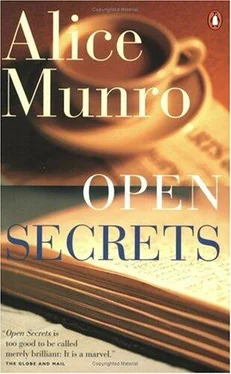The Toms built a city of mud by the riverbank. It was walled with stones against the Bannershees’ attack, and contained a royal palace, a swimming pool, a flag. But then the Toms took a journey and the Bannershees levelled it all. (Of course Eunie and Rhea had to change themselves, often, into Bannershees.) A new leader appeared, a Bannershee Queen, her name was Joylinda, and her schemes were diabolical. She had poisoned the blackberries growing on the bank, and the Toms had eaten some, being careless and hungry after their journey. They lay writhing and sweating down among the juicy weeds when the poison struck. They pressed their bellies into mud that was slightly soft and warm like just-made fudge. They felt their innards shrivel and they were shaking in every limb, but they had to get up and stagger about, looking for an antidote. They tried chewing sword grass — which, true to its name, could slice your skin — they smeared their mouths with mud, and considered biting into a live frog if they could catch one, but decided at last it was chokecherries that would save them from death. They ate a cluster of the tiny chokecherries and the skin inside their mouths puckered desperately, so that they had to run to the river to drink the water. They threw themselves down on it, where it was all silty among the waterlilies and you couldn’t see the bottom. They drank and drank it, while the bluebottles flew straight as arrows over their heads. They were saved.
Emerging from this world in the late afternoon, they found themselves in Eunie’s yard where her parents would be working still, or again, hoeing or hilling or weeding their vegetables. They would lie down in the shade of the house, exhausted as if they had swum lakes or climbed mountains. They smelled of the river, of the wild garlic and mint they had squashed underfoot, of the hot rank grass and the foul mud where the drain emptied. Sometimes Eunie would go into the house and get them something to eat — slices of bread with corn syrup or molasses. She never had to ask if she could do this. She always kept the bigger piece for herself.
They were not friends, in the way that Rhea would understand being friends, later on. They never tried to please or comfort each other. They did not share secrets, except for the game, and even that was not a secret because they let others come and go in it. But they never let the others be Toms. So maybe that was what they shared, in their intense and daily collaboration. The nature, the danger, of being Toms.
Eunie never seemed subject to her parents, or even connected to them, in the way of other children. Rhea was struck by the way she ruled her own life, the careless power she had in the house. When Rhea said that she had to be home at a certain time, or that she had to do chores, or change her clothes, Eunie was affronted, disbelieving. Every decision Eunie took must have been on her own. When she was fifteen, she stopped going to school and got a job in the glove factory, and Rhea could imagine her just coming home and announcing to her parents that was what she had done. No, not even announcing it — it would come out in an offhand way, maybe when she started getting home later in the afternoon. Now that she was earning money, she bought a bicycle. She bought a radio, and listened to it in her room late at night. Perhaps her parents would hear shots ring out then, vehicles roaring through the streets. She might tell them things she had heard — the news of crimes and accidents, hurricanes, avalanches. Rhea didn’t think they would pay much attention. They were busy and their life was eventful, though the events in it were seasonal and had to do with the vegetables they sold in town to earn their living. The vegetables, the raspberries, the rhubarb. They hadn’t time for much else.
While Eunie was still in school Rhea was riding her bicycle, so they never walked together although they took the same route. When Rhea rode past Eunie, Eunie was in the habit of shouting out something challenging, disparaging. “Hi-oh, Silver!” And now, when Eunie had a bicycle, Rhea had started walking — there was a notion at the high school that any girl who rode a bicycle after Grade 9 looked gawky and ridiculous. But Eunie would dismount, and walk along beside Rhea, as if she was doing her a favor.
It was not a favor at all — Rhea did not want her. Eunie had always been a peculiar sight, tall for her age, with sharp, narrow shoulders, a whitish-blond crest of fuzzy hair sticking up at the crown of her head, a cocksure expression, and a long, heavy jaw. That jaw gave a thickness to the lower part of her face that seemed reflected in the thickness, the phlegmy growl, of her voice. When she was younger, none of that had mattered — her own conviction, that everything about her was the proper thing, had daunted many. But now she was five feet nine or ten, drab and mannish in her slacks and bandannas, with big feet in what looked like men’s shoes, a hectoring voice, and an ungainly walk — she had gone right from being a child to being a character. And she spoke to Rhea with a proprietary air that grated, asking her if she wasn’t tired of going to school, or if her bike was broken and her father couldn’t afford to get it fixed. When Rhea got a permanent, Eunie wanted to know what had happened to her hair. All this she thought she could do because she and Rhea lived on the same side of town and had played together, in an era that seemed to Rhea so distant and discardable. And the worst thing was when Eunie launched into accounts that Rhea found both boring and infuriating, of murders and disasters and freakish events that she had heard about on the radio. Rhea was infuriated because she could not get Eunie to tell her whether these things had really happened, or even to make that distinction — as far as Rhea could tell — to herself.
Was that on the news, Eunie? Was it a story? Were there people acting it in front of a microphone or was it reporting? Eunie! Was it real or was it a play?
It was Rhea, never Eunie, who would get frazzled by these questions. Eunie would just get on her bicycle and ride away. “Toodeley oodeley oo! See you in the zoo!”
Eunie’s job suited her, surely. The glove factory occupied the second and third floor of a building on the main street, and in the warm weather, when the windows were open, you could hear not only the sewing machines but the loud jokes, the quarrels and insults, the famous rough language of the women who worked there. They were supposed to be of a lower class than waitresses, much lower than store clerks. They worked longer hours and made less money, but that didn’t make them humble. Far from it. They came jostling and joking down the stairs and burst out onto the street. They yelled at cars in which there were people they knew, and people they didn’t know. They spread disorder as if they had every right.
People close to the bottom, like Eunie Morgan, or right at the top, like Billy Doud, showed a similar carelessness, a blunted understanding.
During her last year at high school, Rhea got a job, too. She worked in the shoe store on Saturday afternoons. Billy Doud came into the store, in early spring, and said he wanted to buy a pair of rubber boots like the ones hanging up outside.
He was through college at last, home learning how to run Douds piano factory.
Billy took off his shoes and displayed his feet in fine black socks. Rhea told him that it would be better to wear woollen socks, work socks, inside rubber boots, so that his feet wouldn’t slide around. He asked if they sold such socks and said he would buy a pair of those, too, if Rhea would bring them. Then he asked her if she would put the wool socks on his feet.
This was all a ploy, he told her later. He didn’t need either one, boots or socks.
His feet were long and white and perfectly sweet-smelling. A scent of lovely soap arose, a whiff of talcum. He leaned back in the chair, tall and pale, cool and clean — he himself might have been carved from soap. A high curved forehead, temples already bare, hair with a glint of tinsel, sleepy ivory eyelids.
Читать дальше












